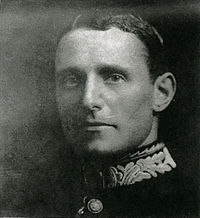Ralph Moor
|
Sir Ralph Moor KCMG |
|
|---|---|
 |
|
| 1st High Commissioner of the Southern Nigeria Protectorate | |
|
In office 6 January 1900 – 1 October 1903 |
|
| Succeeded by | Walter Egerton |
| Commissioner and Consul-General of the Niger Coast protectorate | |
|
In office 1 February 1896 – 1 January 1900 |
|
| Preceded by | Claude Maxwell MacDonald |
| Personal details | |
| Born |
31 July 1860 Furneux Pelham, Buntingford, Hertfordshire, England |
| Died | 14 September 1909 (aged 49) Barnes, London, England |
| Nationality | British |
Sir Ralph Denham Rayment Moor KCMG (31 July 1860 – 14 September 1909) was the first high commissioner of the British Southern Nigeria Protectorate.
Ralph Moor was born on 31 July 1860 at The Lodge, Furneux Pelham, Buntingford, Hertfordshire as son of William Henry Moor (c. 1830 – c. 1863), surgeon, by his wife Sarah Pears. Educated privately, and destined for business, he engaged in 1880–1 as a learner in the tea trade. On 26 October 1882 he entered the Royal Irish Constabulary as a cadet, and becoming in due course a district inspector resigned after involvement in a divorce case on 9 February 1891.
In March 1891 Moor took service under Sir Claude Maxwell MacDonald, the Consul-General of the Oil Rivers Protectorate, as Commandant of Constabulary in the protectorate. In July 1892 he was appointed by the Foreign Office vice-consul for the Oil Rivers district, and from 6 September 1892 to 15 February 1893 acted as commissioner. During January 1896 he served the office of consul, and on 1 February 1896, when the district was formed into the Niger Coast Protectorate, he was made commissioner and consul-general for the territory, and consul for the Cameroons and Fernando Po.
When in 1900 the protectorate passed from the Foreign Office to the Colonial Office, Moor became High Commissioner of Southern Nigeria and laid the foundations of the new administration, his health failing, he retired on pension on 1 October 1903. He then allied himself with Sir Alfred Lewis Jones; he gave valuable advice on West African affairs, and aided in the development of the British Cotton Growing Association. He also served on certain committees at the nomination of the secretary of state.
...
Wikipedia
